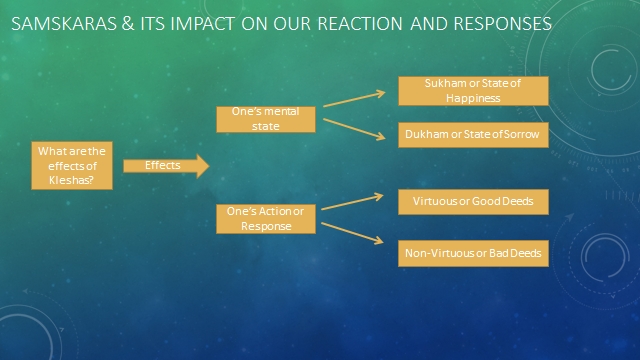
Reactions and Responses
At a recently held meeting of the Yoga Teachers of the Triangle (yttonline.org), Ramani Ayakannu made an excellent presentation where he discussed the guidelines presented by Patanjali in his Yoga Sutras on social behavior patterns. Ramani has very kindly agreed to share the presentation with all of you through this blog. Below is a brief summary of the presentation. I am also attaching the powerpoint presentation as well as the audio recording of his talk. Please review this highly informative and useful material and provide your valuable feedback.
Introduction by Ramani Ayakannu
The following is a brief summary of the presentation titled “Patanjali’s Approach to social behavior”. The topic of discussion is based on sutra I.33 of the Yoga Sutras of Patanjali (YSP).
Sutra 1.33
मैत्रीकरुणामुदितोपेक्षणां सुखदुःखपुण्यापुण्यविषयाणां भावनातश्चित्तप्रसादनम्॥३३॥
maitrIkaruNaamuditopekShaNaam sukhaduHkhapuNyaapuNyaviShayaaNaaM bhaavanaatachittaprasaadanam
"By cultivating attitudes of friendliness toward the happy, compassion for the unhappy, delight in the virtuous, and disregard toward the wicked, the mind-stuff retains its undisturbed calmness." (Translation by Swami Satchidananda)
The sutra describes the state of mind when we respond or react to events that occur around us. Events are occurrences or interactions with others around us and received as inputs through our five sense organs, namely, eyes, ears, nose, tongue and skin. These events transmit information to us, which in turn are turned into processed by our brain (Manas). The processed information is then stored in our brain as experiences or Samskaras. These Samskaras may impact one’s Kleshas (afflictions) in a manner which may alter one’s behavior and actions. Kleshas, as we already know, are the reason for all our pain and sufferings.
The sutra I.33 provides a useful tool or methodology to carefully observe one’s own or others’ behavior, actions or mental state and then classify them into four main categories. These four mental state – action/behavior classification provides an insight into the behavior of individuals to events (both internal and external) and interaction between individuals. The result of interaction between individuals can lead to either a conflict or enabling. In either case, the outcome is accumulation of more Samskaras or amplification of the already existing Samskaras.
Sutra I.33 provides a powerful tool that, when mastered will help us respond and not react to an event. A response to an event has the effect of no accumulation of new Samskaras or amplification of existing Samskaras. This presentation shows how to apply these tools embedded in sutra I.33 when exposed to individuals who fall into any of the categories. A brief introduction to stress management is also presented.
Patanjali’s approach to social behavior (pdf – powerpoint presentation)
Patanjali’s approach to social behavior (audio recording of Ramani’s presentation)
[…] (http://yogawithsubhash.com/2014/05/24/patanjalis-approach-to-social-behavior/) […]